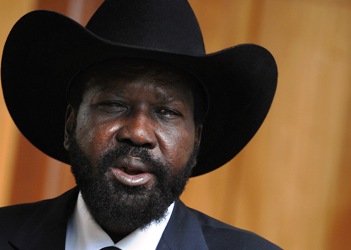South Sudan president appoints media regulatory authority
May 14, 2015 (JUBA) – South Sudanese president Salva Kiir has issued an executive order appointing media regulatory authority, whose membership includes officials of the national intelligence in the country.

Another decree appointed William Haisasa from Juba University as head of Broadcasting Corporation. Seven other members were also appointed to the board from different institutions.
The Media Authority and Broadcasting Corporation will regulate operations of both public and private media in the country, but critics throw doubt on its independence given polluted membership and tightening restrictions.
Rights groups have been warning of crack down on journalists by security forces, suffocating debate on how to end a civil war in which tens of thousands of people have been killed in the past 17 months of the war between pro-government forces and those loyal to former vice president, Riek Machar.
The leadership of the overdue Media Authority and Broadcasting Cooperation include government media, academic and legal representatives, as well security officers, said the presidential decree.
Media Authority, first of its kind since South Sudan became independent three years ago, was established after the president signed the media bill last year after many calls by journalist to establish the regulatory body.
This latest decision was announced after president Kiir held a meeting with information and broadcasting minister, Michael Makuei Lueth, who last week told journalists that security operatives must be given the power to arrest, detain and take to court reporters who write news the government sees false or infringing on national security.
The head of Union of Journalists of South Sudan (UJOSS), Oliver Modi, described the appointment of security officials on the boards as an infiltration and a mistake which denied independence of the bodies.
“The decision to include in the appointment members of the security was unwise. It was a mistake because, first of all, what is the security man going to do?”, he inquired.
He said it would be wise to enhance cooperation between journalists and the security by allowing the latter to come on their own if they wanted to monitor the work of the media but not to make them be part of the media authority.
(ST)
Related article
South Sudan threatens to detain and take journalists to court
